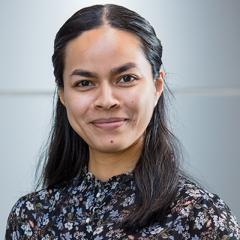Pioneers in the emerging imaging omics approach, where imaging morphological data and spatial transcriptomics and proteomics are integrated to study in vivo biological processes
Cancer first starts as single cancer cells and evolves within an ecosystem of multiple cell types in a tissue.
Understandings of the heterogeneity of cancer cells in their cellular ecosystem will allow for early diagnosis, accurate prognosis and targeted treatment of cancer.
The Genomics and Machine Learning Lab is applying imaging genomics to study cancer in every single cells and within their spatial tissue context.
We aim to address long-standing questions on how individual cell types are different and how do these multiple cell types coexist and develop as an ecosystem within a diseased tissue.
Our goal is to find cure for cancer one cell at a time.

Group leader

Dr Quan Nguyen
Group Leader, Genomics and Machine Learning
+61 7 334 62394
quan.nguyen@imb.uq.edu.au
UQ Experts Profile
We aim to improve diagnosis and disease management by advancing understandings of cancer and immune cells at single cell level and within tissue morphological context. Our mission is to cure disease one cell at a time within an ecosystem of millions of cells.
Our daily research strives for creativity and innovations. We like new challenges and are keen to explore areas outside our comfort zones. Each member in the group is a leader and all members are supporting each other. We respect diversity, equity and integrity.
We have developed innovative machine learning approaches to find cancer cells and predict their progression within histopathological images.
We are always open to research collaborations and looking for complementary expertise to our spatial omics capability.
Our research is supported by Australian Research Council, National Health and Medical Research Council, Genome Innovation Hub (UQ), Metro North Hospital and Health Service, Brisbane Diamantina Health Partners, RBWH and RBWH Foundation, The Australian Skin and Skin Cancer Research Centre (ASSC), VinGroup Innovation Fund
We collaborate closely with cancer and neuroscience researchers. Collaborative projects often require sample recruitment, data generation, analysis, interpretation and validation. Our collaborations results in shared senior/first-authored publications and co-applications for funding.
Our Approach
Our group is among the pioneers in the emerging imaging omics approach, where imaging morphological data and spatial transcriptomics and proteomics are integrated to study in vivo biological processes. Spatial data that we can generate include those from spatial transcriptomics (10xVisium, RNAscope, and NanoString Digital Spatial Profiling), spatial proteomics (Hyperion imaging mass cytometry, NanoString DSP, and multiplexing protein imaging). We have also established single-cell sequencing capability. The spatial cellular genomics approach enables us to address a research question from unbiased discovery to targeted validation.
All of the above mentioned technologies generate a vast amount of data. The ability to develop advanced computational-statistical analysis methods is crucial. Therefore, about 70% of our lab is dedicated to data analysis. We are pioneering in developing machine learning models, utilizing both tissue morphology and molecular gene expression as informative features, to discover in situ biological processes underlying cancer tissue heterogeneity. We integrate single-cell spatiotemporal sequencing data with tissue imaging data to find causal links between cellular genotypes, tissue microenvironment, and disease phenotypes.
Research Areas
We are focusing on two types of cancer. More people are affected by skin cancer than any other cancer and paediatric brain cancer being the leading cause of disease-related mortality in children. We aim to improve early diagnosis of melanoma and find mechanisms for drug resistance in brain cancer. Our research is contributing to the revolution of digital pathology and targeted immunotherapy in for cancer. In collaboration with national and international research groups, we are also working on kidney cancer and colorectal cancer.
We are also interested in investigating the complexity of the central nervous system. Particularly, we will study neuronal control of disease, an important research area that requires innovative approaches like single cell and spatial omics technologies.
General enquiries
+61 7 3346 2222
imb@imb.uq.edu.au
Media enquiries
IMB fully supports UQ's Reconciliation Action Plan and is implementing actions within our institute.
Support us
Donate to research
100% of donations go to the cause








